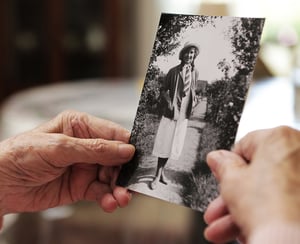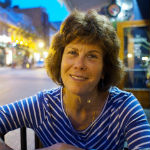Published: December 13, 2018

My mother rarely turned down a dinner invitation or get-together with friends. In later years when she lamented that her “social calendar” was skimpy, she tried to find creative ways to fill it.
But like many older adults, my mother also cherished solitude, often with a good book, devotional or Lexi, her toy fox terrier, in her lap.
One of the blessings of growing older is solitude, which is different than isolation, writes Joan Chittister in The Gift of Years.
“Solitude is chosen. It is the act of being alone in order to be with ourselves. Solitude is not a way of running away from life, from the aging process, from our feelings. On the contrary. This is the time we sort them out, air them, get over them, and go on without the burden of yesterday.”
This late-in-life self-reflection can take many shapes. Let’s explore some of them.
Workbooks and Other Writing Tools
Many of us have a baby book in which our parents recorded our first word and when we took our first step, and many of us filled these books out for our children.
There are memory books for older adults too, such as Family Tree Memory Keeper, All Things Bright and Beautiful: A Record Book, and My Life’s Reflection: A Life Review Workbook.
Cleveland writer Sunny Jane Morton leads family history workshops and wrote Story of My Life: A Workbook for Preserving Your Legacy.
Here are two tips from her workbook:
-
Write out whatever you remember. Simply write your subject (e.g., "Grandpa") across the top of a page and write "I remember" followed by whatever comes into your head for five or ten minutes. Don't worry about spelling, grammar or formatting, simply writing down your stream of consciousness can help unearth long-forgotten memories. And if you run out of memories about your subject, simply write "I remember" over and over until you actually have a memory to write.
-
Collaborate with others. Hearing about a particular time, place or person, from someone else, can give you a fuller perspective and help trigger more memories (and, if the accounts are different, lead to interesting questions). Share copies of the book's forms with relatives, friends, neighbors and any other important people in your life to make recording your story a collaborative effort. To help with this, many of the forms in this book have an "As Remembered by" line, allowing you to record who remembered what.
Another way to share your memories with loved ones is by writing a legacy letter, also called an ethical will. In a legal will we designate who gets our money and possessions, in an ethical will we pass along our values, beliefs and life lessons.
Some people write several pages and hand it out to loved ones while they are alive. Others write a short letter to be opened after their death. (That’s what my mother did.) What you write and how it is dispersed is up to you. And speaking of possessions, make sure your loved ones know why you cherish the locket or painting they are inheriting.
There are also workbooks, such as Ethical Wills: Putting Your Values on Paper and professionals to help you write (or record) an ethical will. Susan Turnbull, author of The Wealth of Your Life: A Step-by-Step Guide for Creating Your Ethical Will, offers these tips.
-
Start today. If you were not here tomorrow, what is the most important thing you would not want to be left unsaid? Write it down – you’ve begun.
-
Relax. You are not trying to write for the Pulitzer Prize. What you create is a gift of yourself, made for those you love, not for an imaginary panel passing judgment on your life or your writing.
-
Consider the process a work in progress. Start by writing something short and add more pieces or pages as you wish. It’s natural, that as you and your audience grow and change, you might want to modify or add to what you wrote. Don’t let the feeling that it has to be “perfect”, from the beginning, paralyze you. Just get started.
-
Make sure it is easy to find. Keep the file accessible, so you can add to it easily. Either keep it with your legal papers or affix a note there about where to find it. You want to make sure your words find their intended audience.
Maybe you want to write your life story as a memoir and give it as a gift to family members and friends. You find lots of help online, including e-publishers and self-publishers such as Small Batch Books, which also provides writing, editing and design services.
Also check with your local college, library or senior center for life-writing classes.
Then again, you might just need a colorful journal or spiral notebook to get your thoughts down on paper.
Tell Your Story with Photographs
One of the most pressing issues facing older adults as they downsize and simplify their lives is what to do with multiple boxes and albums full of photographs. (They lived through the era of double prints so lots of duplicates to sort through too.)
Some people assemble photo albums or make collages for their adult children and grandchildren, or scan photos and give each family member a thumb drive. You can also publish a photo book.
Here are some dos and don’ts as you select memorable photographs to help tell your story.
-
Make sure you identify who is in the photograph and where it was taken, and use the correct marker. Archival Methods recommends a soft #2 pencil, preferably Stabilo-All Pencils.
-
Store photos off the floor in case of floods, and if possible, out of basements or attics and away from vents and rooms that share an outside wall where temperature or moisture fluctuations can cause damage.
-
As you go through keepsake photos make a video, or better yet recruit younger relatives to interview you for an audio or video recording. “They have amazing stories that will be lost forever if we don’t get them on tape,” said A.J. Jacobs, author of It’s All Relative: Adventures UP and Down the World’s Family Tree.
A Final Reflection
As you spend quiet time reflecting about the past your thoughts might turn to future adventures and a desire to create new memories.
Former President George H.W. Bush commemorated milestone birthdays, including his 90th birthday, by jumping out of an airplane. My mother wanted to know what the “Parrothead” fuss was all about so at age 80 went to her first (and last) Jimmy Buffett concert.
For others, it’s a solo sail or stand-up comedy. Whatever your bent, it’s never too late to start or add to your bucket list.
On a more serious note, maybe your reflection has led to thoughts of forgiveness, regrets, troubled relationships and other unresolved issues. You might consider enlisting a trusted friend, counselor or spiritual director as you travel along that journey.
As Joan Chittister writes at the end of her book, “It is time to ask ourselves what legacy we are leaving behind. Because one thing is sure: whether or not we give much thought to it, everyone else we know will.”
 In the past, Molly Kavanaugh frequently wrote about Kendal at Oberlin for the Cleveland Plain Dealer, where she was a reporter for 16 years. Now we are happy to have her writing for the Kendal at Oberlin Community.
In the past, Molly Kavanaugh frequently wrote about Kendal at Oberlin for the Cleveland Plain Dealer, where she was a reporter for 16 years. Now we are happy to have her writing for the Kendal at Oberlin Community.





